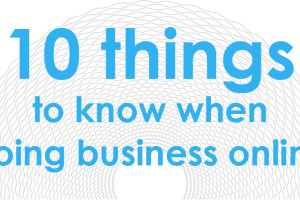European Commission launches tool that helps with selling cross-border

The European Commission has launched a tool that should help online retailers, especially small and medium enterprises, with selling online and going cross-border. The tool provides guidance on what the legal rules are and what steps need to be taken to be compliant with certain laws and regulations.
When you want to start selling online in Europe, especially if you dream of selling cross-border, you might feel held back by all those different rules and regulations. Luckily, the European Commission agrees and set up a page where you can easily access information on legal rules and obligations. The tool, called “10 things to know when doing business online“, is part of Watify. This is a project of the European Commission that stimulates digital entrepreneurship.
10 things to know when doing business online
How can I protect my business idea?
By using a Non-Disclosure Agreement you can protect your business idea before the product or service is ready for the market. But you should also start thinking about how to ensure you enjoy exclusive rights. This page tells you more about using a NDA, selecting protection for your IP and how to make your ownership rights clear on your website.
How can I secure my website?
This page tells you all about how you should pay careful attention to the development and maintenance of your website. It goes on about how cybersecurity incidents could have a high impact on your business or brand.
What should I do when setting up a web shop?
This step is of course one of the most important ones. It gives you some basic information about what to do when you want to set up a web shop. Will you develop your own system of will you choose for an existing web shop? This page also shares information on how to register a domain name, why you should integrate a disclaimer on your website and it shares which countries in Europe allow you to adopt the opt-in approach when it comes to asking permission to use cookies.

How do I make sure I comply with personal data protection rules?
Customers sometimes share their personal data very easily, but as an online retailer you must protect their data from misuse and also respect their right to privacy when you process said data. One of the things this page teaches you is that you may not process sensitive data unless you have explicit consent from the data subject. It also gives information on how to follow personal data protection requirements and where you should go to if you want to notify your national supervisory authority (because you must when you process sensitive data!).
How do I promote my activities while complying with the law?
The Watify tool also shares some insight on what you must keep in mind when you make use of commercial communication to promote your online store. For example, if you display discounts or promotional offers online, you must clearly indicate on whose behalf the commercial communication is provided, the offer you are advertising and any qualifying conditions, e.g. who is or is not eligible to take part in the offer and on what terms.
How to make sure my contract complies with the law and is ‘bullet-proof’?
“Your terms and conditions, and your ordering process, constitute a contract with your customer”, this page says. But in order for the contract to be valid, and to minimize the risk of mistakes and misunderstandings that could jeopardize the contract, you – again – need to follow some rules. This page tells you what information is necessary on your website, how you should inform your customers before they place an order and how you can make sure the order is confirmed.

What should I know about online payments?
According to this page, making it easy and smoothing for your customers to pay, reduces the risk of the shopping basket being abandoned. So you should give them different payment methods to choose from. This page gives you more information about online payments, e.g. why you should consider offering alternative payment methods and what the advantages are of using one payment service provider.
How can I comply with VAT obligations?
When you sell online you must deal with tax paid on consumption, better known as value-added tax or VAT. You should know that different rules apply depending on tho whom, where and which goods you sell or services you offer. Every country in Europe has its own rules, so this page teaches you more about it.
What should I know about delivery services?
There’s no ecommerce possible without proper delivery of goods. So you chould choose the delivery solution that works best for you and for your customers. In order to make the right choice, you should first understand what your customers’ expectations are. But you should also make sure you are familiair with national and European rules in terms of customer rights and shipping goods across Europe. This page helps you on your way.

What do I need to know about the after-sales process?
After you protected your business idea, set up your online store, promoted your offer and started selling to your customers, you’re still not there. You should provide your customers with good after-sales service as this enhances customer loyalty and encourages people to visit your website to make even more purchases. This page explains how you must provide customers with information about guarantees and how you can offer an easy-to-use complaints procedure on your website.

Comments